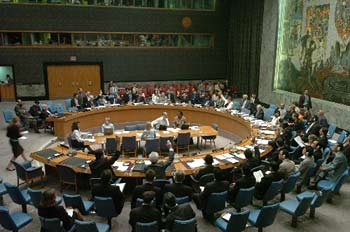
The UN Security Council holds an emergency meeting and
unanimously approves a presidential statement at the UN headquarters in New
York, July 30, 2006. -Xinhua
The UN Security Council yesterday passed a resolution urging Iran to stop
uranium enrichment by August 31 or face possible economic and diplomatic
sanctions.
The resolution was adopted by a vote of 14 to 1. Qatar, the only Arab nation
on the Council this month, cast the only negative vote.
In his explanation after the vote, Qatar's UN envoy Nassir Al-Nasser said
Qatar appreciates the efforts by the six nations in seeking a peaceful solution
through offering Iran an integrated package, but fears that proceeding with the
resolution at this critical time neither serves the security in the region nor
the unity of the Council.
"We do not agree with the tabling of this resolution at a time when our
region is in flames," he said. "We see no harm in waiting for a few days to
exhaust all possible means and in order to identify the real intentions of
Iran."
The resolution, under negotiation for weeks, demands Iran "suspend all
enrichment- related and reprocessing activities, including research and
development."
On the insistence of Council members such as Russia and China, the resolution
has dropped the threat of immediate sanctions, and requires the Council to hold
further discussions before it considers sanctions.
Addressing the Security Council after voting, Liu Zhenmin, Chinese ambassador
to the UN, stressed that dialogue and negotiations are the only way out, and the
UN nuclear watchdog IAEA should always be the main mechanism for dealing with
this issue.
He noted that the solution requires all-round diplomatic efforts; any
measures adopted by the Security Council should serve the purpose of diplomatic
efforts.
Liu said that the resolution has expressed the intention, in the event that
Iran fails to comply with this resolution, that the Security Council shall adopt
appropriate measures under Article 41of the UN Charter to persuade Iran to
comply with this resolution and the requirements of the IAEA.
On the other hand, he stressed, in the event Iran fulfills its obligations
and returns to the negotiation table, it will not be necessary for the Council
to adopt additional measures.
John Bolton, the US ambassador to the United Nations who has been pushing for
a strong stand on the Iranian nuclear program, said the resolution is the first
on Iran in response to its nuclear weapons program, reflecting the gravity of
this situation and the determination of the council," he said.
"We hope this resolution will demonstrate to Iran that the best way to end
its international isolation is to simply give up the pursuit of nuclear
weapons."
Explaining Iran's position on the nuclear issue, Iranian UN Ambassador Javad
Zarif said that Iran is not seeking confrontation and has shown its readiness to
engage in serious and result-oriented negotiation based on mutual respect and
equal footing.
"Iran's peaceful nuclear program poses no threat to international peace and
security and therefore dealing with this issue in the Security Council is
unwarranted and void of any legal basis or practical utility," he said.



